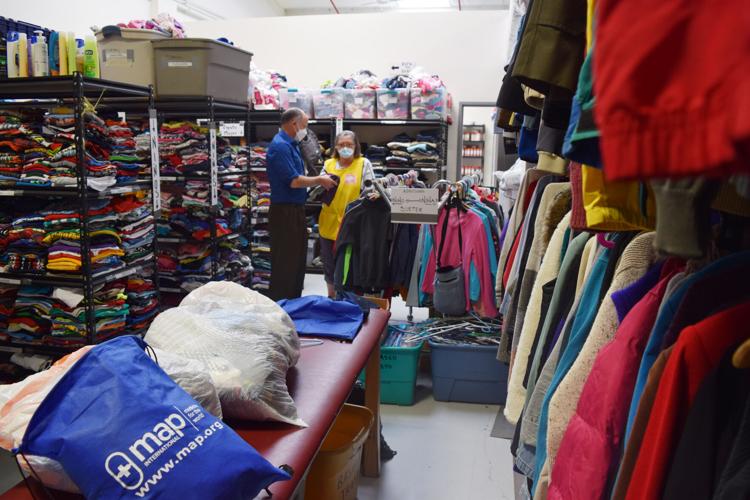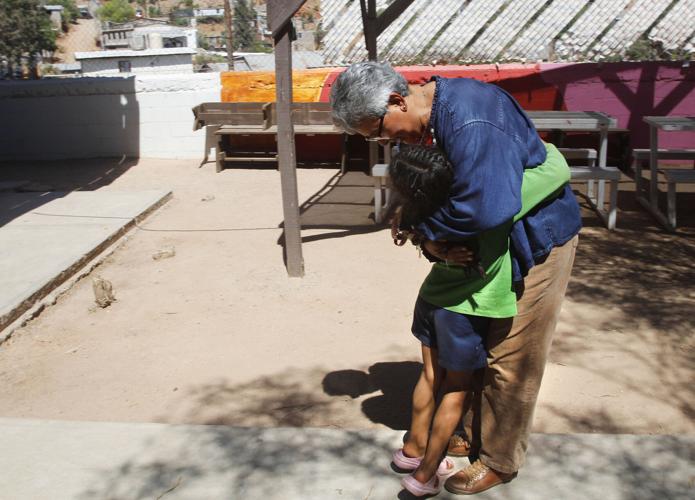Migrant shelter operators in Sonora, Mexico say they’re preparing for the expected return of 700 Mexican nationals each day from U.S. Border Patrol’s Tucson sector, under the Biden administration’s new executive order that dramatically restricts access to asylum.
“Repatriations” of migrants in Arizona to four Mexican border towns were expected to begin Tuesday night at midnight, according to a Tuesday memo from Mexican consulate officials obtained by the Arizona Daily Star. The memo came hours after the Biden administration’s announcement of an executive order banning asylum requests for most border-crossers between ports of entry when the border is deemed overwhelmed.
The memo, written in Spanish, said the Border Patrol had just informed the consul general in Nogales, Arizona “that they have received instructions from Washington to begin the ‘expedited removal’ process through Nogales at midnight. … They estimate more than 700 repatriations per day through this sector of the Border Patrol.”
Binational nonprofit Kino Border Initiative’s migrant shelter in Nogales, Sonora, encountered four adults and two children who were subject to expedited removal from the U.S. on Wednesday morning, staff said, but it wasn’t clear if others had been returned overnight.
Migrants would face security risks if released after-hours in border towns, said Pedro De Velasco, director of education and advocacy for binational nonprofit Kino Border Initiative.
Humanitarian groups there “all agree that no repatriation, deportation or returns should happen during the night,” De Velasco said Wednesday. “Shelters are closed, and people are just in a more vulnerable situation and at risk of being robbed, kidnapped or having to sleep on the streets.”
The memo from Mexican consulate officials — sent to a coalition of migrant shelters in Nogales, Sonora on Tuesday — said the expected 700 Mexican migrants returned daily under the executive order would be spread between four Sonoran border towns: Nogales, Naco, Agua Prieta and Sonoyta.
The Border Patrol plans to return vulnerable migrants, such as children and adolescents, through the Nogales port of entry, and others through the port closest to where they were detained, shelter directors in Nogales, Sonora said.
But consulate officials could not confirm whether migrant returns would take place overnight, which is concerning, De Velasco said. It’s also not yet clear which, if any, other nationalities will also be returned to Mexico.
“Information is what we need the most at this time, so that we can prepare,” he said.
Officials with U.S. Customs and Border Protection in D.C. did not respond to the Star’s efforts to confirm the details in the consulate’s memo. An Arizona-based spokesman said he couldn’t confirm or deny the memo’s contents.
De Velasco said Kino’s migrant shelter in Nogales, Sonora is less than half-full now, due to lower migrant-arrival volumes in recent months, and they’re well-prepared to help. But outside Nogales, Sonora, smaller border communities have less infrastructure to receive expelled migrants and offer support, he said.
“We need the (Mexican) federal government, the state government and the municipal government to sit down with the NGOs (nongovernment organizations) so we can come up with a plan, because if we are not having this close communication and collaboration then yes … it will overtake us,” he said.
Sonoran Gov. Alfonso Durazo’s office did not immediately respond to the Star’s requests for comment on Wednesday, nor did the office of Nogales Mayor Juan Francisco Gim Nogales.
Mexican consulate officials in Tucson and Nogales, Arizona said they didn’t have permission to comment publicly yet on the expedited removals.
De Velasco said Mexican authorities should advocate strongly for assurances of migrants’ safety in discussing migrant removals with U.S. counterparts.
“Mexican authorities should make sure to push whenever these discussions happen, but they’re just folding their hands and accepting whatever the U.S. is mandating,” he said. “I can only see this getting worse once the volumes increase. … It gives you a sense of how the relationship is right now: The U.S. dictates and Mexico accepts, without any pushback.”
More desert deaths likely, advocates say
Biden’s new executive order bans asylum requests for most border-crossers once the Border Patrol’s migrant-apprehension rate reaches a seven-day average of 2,500 arrests between ports of entry border-wide.
The order was expected to go into effect right away, because apprehensions now exceed that level, experts said.

At the Kino Border Initiative, migrants receive services like meals, clothes, shelter for the most vulnerable, and access to organizations that provide free legal services.
Asylum requests will only be processed again after average daily arrests fall to 1,500, a level last seen four years ago, during the COVID-19 pandemic.
Under Biden’s executive order, border agents are no longer supposed to ask border-crossers if they’re claiming fear and seeking asylum. Migrants who don’t affirmatively express fear, or an intention to request asylum, will face expedited removal, a possible five-year ban on re-entry and criminal prosecution.
Those who do express fear will face a higher standard in their credible-fear interviews with asylum officers, but could be eligible for other lesser protections than asylum.
Advocates say the expedited removals — not official deportations, which are ordered by an immigration judge — under Biden’s executive order will return would-be asylum seekers to dangerous situations.
The order will also end up driving crossings between ports of entry by those who can’t access asylum at official ports, due to strict limits imposed by the Trump and Biden administrations, said Alba Jaramillo, co-executive director of the Immigration Law and Justice Network.
But instead of the recent trend of border-crossers surrendering to Border Patrol agents en masse, in order to request asylum — which is currently legal under U.S. law, despite Biden’s executive order — more asylum seekers will now seek to evade detection, she said.
That will likely lead to a surge in migrant deaths in the Southern Arizona desert, as happened during the pandemic-era Title 42 policy that immediately expelled border-crossers to Mexico, without giving them the chance to request asylum, said Jaramillo, who provides legal counsel to asylum seekers at Casa de la Misericordia shelter in Nogales, Sonora.
A new analysis of the executive order’s potential impact by immigration-rights group American Immigration Council said limited resources to carry out deportations, and the need for repatriation agreements with migrants’ countries of origin, will rein in the intended effect of Biden’s executive order.
“Diplomatic and resource constraints limit the government’s ability to execute its own plan,” it said. Due to too-few asylum officers to conduct credible-fear screenings, for migrants who do express fear, “recent history indicates that the U.S. will be unable to put everyone through the new, more restrictive processes, and that a significant number of people will still be released into the United States pending court hearings — even though they may be deemed ineligible for asylum at those hearings.”
Asylum seekers are already turned away from ports of entry, if they don’t secure one of the limited appointments through the Biden administration’s “CBP One” smartphone application, Jaramillo said.
Those who use CBP One aren’t affected by Biden’s executive order, but securing an appointment is already a difficult or impossible challenge for many, Jaramillo said.
“We have asylum seekers at the shelter waiting nine months, trying daily to access an appointment and not being able to,” she said. “They’re in danger, they want to get through and so, many of them actually attempt to go through the desert. And now they’re being criminalized.”
The American Civil Liberties Union has already vowed to sue the Biden administration for what ACLU attorneys call an “illegal” restriction on access to asylum, similar to Trump administration policies that were ruled unlawful in federal courts.
But even if the policy is quickly struck down, migrants will suffer in the meantime, Jaramillo said.
“I suspect it’s not going to be a policy that is going to remain in place,” Jaramillo said, “but the immediate consequences are going to be so great. … It’s going to create an even greater humanitarian crisis, that is being created by our own U.S. government, all in an effort to win political points with those that are more conservative. It’s very shameful.”
Small communities may struggle
Shelters in Sonora’s smaller communities, like Sonoyta, south of Lukeville, Arizona, that are expected to receive expelled migrants must tread carefully amid ongoing battles between splintered organized crime groups, Jaramillo said.
Jaramillo said she’s been threatened by cartel members for her legal-aid work with migrants in Sonoyta, as have other humanitarian workers there. Efforts to help migrants access asylum through official channels is a threat to criminal groups’ lucrative smuggling business, she said.
Two years ago she filed a complaint with Sonoyta authorities, after she learned of multiple women being raped in a migrant shelter there, which was “run by a cartel,” she said.
The man leading the shelter threatened the migrants talking to her, and sent a message that “they were watching me,” Jaramillo said. “Since then, I’ve been careful about being too visible” in Sonoyta.
Karla Betancour runs a migrant shelter in Sonoyta that can house 200 people, and currently only has 60 guests, she said. They’ve been preparing to receive more migrants who might be returned under Biden’s executive order, but more than 150 or so that would be problematic, she said in Spanish on Wednesday.
Betancour said her shelter receives families with children who haven’t eaten in four days, people who have been kidnapped and women who have been raped in their journey through Mexico. For them to be turned away after crossing the U.S. border, believing they’ve finally made it to safety, would be devastating, she said.
“To go through all that and not be able to complete their mission, I feel it’s something very unjust, truly,” she said.
In Agua Prieta, across the border from Douglas, Arizona, aid workers are ready to help people expelled from the U.S., said Mark Adams, of binational faith-based aid group Frontera de Cristo, which partners with the Migrant Resource Center in Agua Prieta.
Since January, the center has tallied more than 1,200 migrants expelled from the U.S. through “voluntary returns” or other removal mechanisms. Adams emphasized increases in shelter guests are never a burden.
“It’s an opportunity to provide a sense of safety, dignity and security to folks who are in very vulnerable situations,” Adams said. “I think for many of us in the communities of faith and communities of conscience, it’s concerning that vulnerable populations would be seen as burdens because that then places them as a cause of a problem, when they’re actually the folks who are suffering from systematic problems that aren’t providing opportunities for the most vulnerable in society.”
Previously asylum seekers also had the option to wait in line outside certain ports of entry, like the DeConcini port in Nogales. Some even camp overnight for weeks, waiting for a chance at one of the few daily walk-up appointments available.
But now, under Biden’s executive order, that is no longer an option, De Velasco said.
“It basically means that right now, the only way migrants have to access asylum at the U.S.-Mexico border is through the CBP One app,” he said.

A young resident at Casa de la Misericordia in Nogales, Sonora runs up to shelter director Alma Angélica Macías Mejía and gives her a big hug, on a recent May morning. The shelter is the only one in Nogales, Sonora that allows residents to stay until they secure a CBP One appointment.
Organized crime groups thrive when safer routes to immigrate or request asylum are cut off, Jaramillo said. Even before the executive order, when buses arrive in northern Mexico to drop off migrants expelled from the U.S., smugglers are waiting for them, she said.
“They approach them immediately, the minute they’re left on the Mexican border,” she said. “Now it’s just going to give so much power to the cartels — greater kidnappings, greater harm, greater economic power.”





